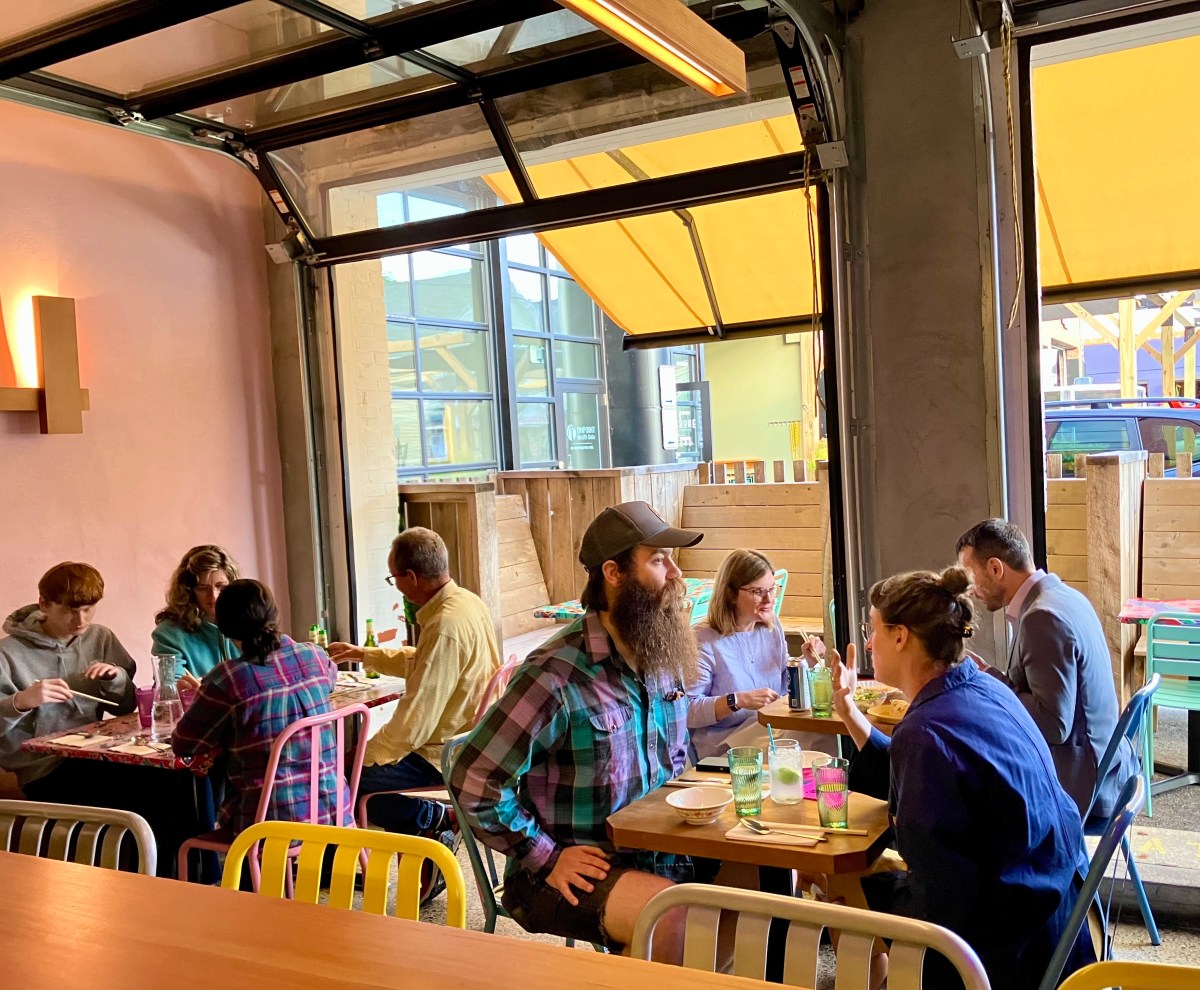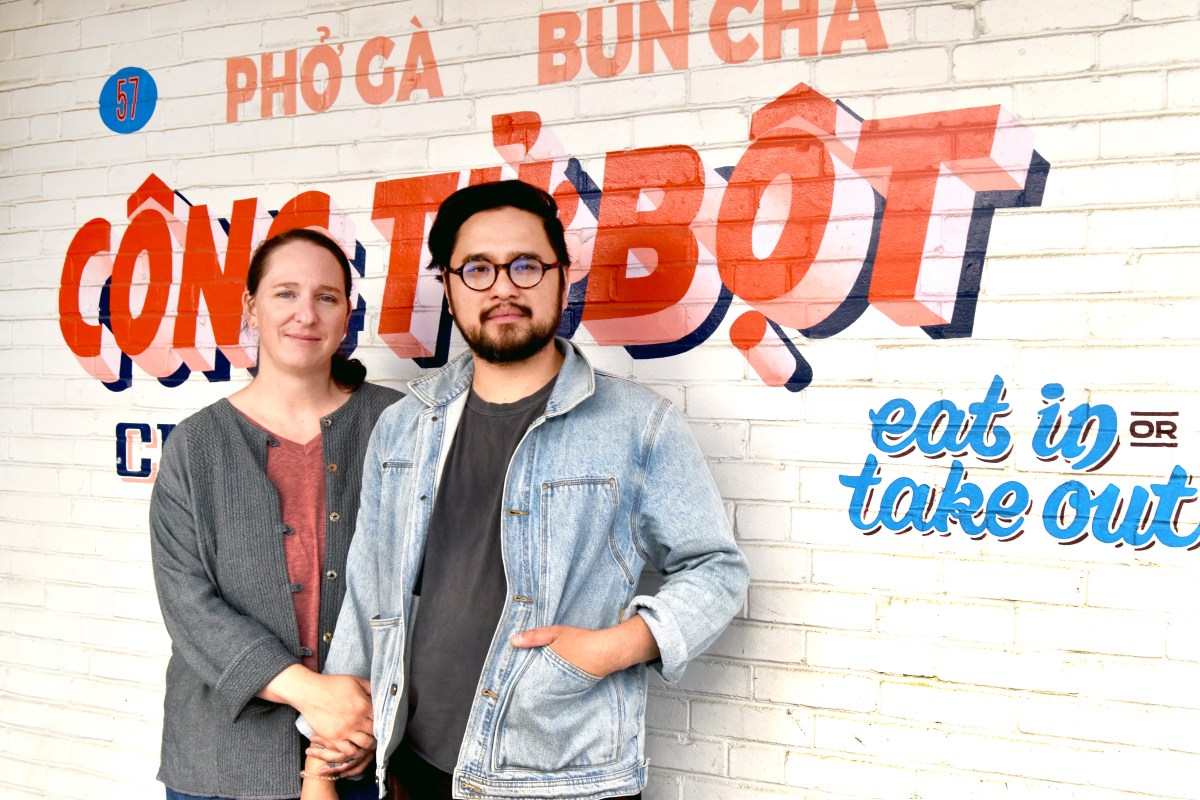Walk into Cong Tu Bot, a popular Vietnamese restaurant in Portland, Maine, and you might smell shrimp cakes with turmeric and scallion, or caramel braised Faroe Island salmon, or congee with local organic king oyster and mung bean, being prepared in the open kitchen. The lively restaurant has both communal counter and individual table seating, inside and outside of a wall that rolls up similar to a garage door.
On a recent Monday night, as the setting sun streamed into the restaurant, Chef Vien Dobui, one of the co-owners along with Jess Sheahan, donned a striped apron, his longer hair bits in a top knot, cooking his own take on Vietnamese dishes. Dobui is the child of Vietnamese refugees and although he was never formally trained as a chef, he’s been a James Beard Award finalist and semifinalist in 2020 and 2022, respectively.

Dobui and Sheahan opened Cong Tu Bot in 2017. The staff of 21 unionized the restaurant in April, joining Unite Here!, a labor union representing 300,000 workers in North America in several sectors including food services. Unite Here! is headquartered in New York City and has local chapters across the US and in Canada. According to Maine AFL-CIO, Cong Tu Bot is the first independently-owned restaurant in Maine to unionize in 40 years. And nationally, only 1.4% of food and drink services employees are unionized, according to the U.S. Bureau of Labor Statistics.
One might assume the owners of a small, independently owned restaurant would discourage unionizing efforts, but Dobui and Sheahan welcomed them. Dobui and Sheahan say they are not worried about their staff’s demands as they await being presented with their now unionized staff’s first contract. Cong Tu Bot is not currently profitable, but well-positioned to be profitable by next year, according to Sheahan. Many small operations that lack the resources or access to capital that large companies have may have to increase prices to add more employee benefits. Profit margins in the industry are typically under 10% and in many cases, under 5%.
Dobui and Sheahan spoke with New Builders Dispatch about their staff’s unionizing efforts.
Nina Roberts: Why were you supportive of your staff as they began to organize and take steps to unionize? Weren’t you scared they would demand too much?
Vien Dobui: From the outset, we wanted to find ways to build a better relationship between employer and employee. That has always been our approach from conception, to now. And encouraging them to unionize, or encouraging a unionization effort, is just a logical extension. I feel passionate about food, Vietnamese food, but I also want to be a good employer.
Jess Sheahan: We were trying to build a place where we listened to everybody, took their feedback and brought that into policy—our tipping policy, we pool and share tips with every hourly employee—things like that.

I was having all these individual conversations, but they didn’t have a way to necessarily spend time talking to themselves about what they wanted this place to be. So, it was like, “It would be great if you all could get together and talk about what you wanted, bring those ideas to us and we could try to implement them. You’d be asking for something that you knew collectively, you all wanted.”
The joke was that what I was describing, is a union. Obviously, whether or not we meet those demands, is another set of challenges.
NR: The pandemic uncovered some dismal truths about service workers; many live paycheck to paycheck. However, it also revealed that small businesses have very slim margins. A small business might not have the funds to accommodate what a union asks.
VD: It goes back to a healthy relationship between employer and employee. We practiced, since day one, financial transparency, so they kind of know how the restaurant is doing, financially.
NR: They know how much money is being…
JS: They know how much we take home. They know all of that stuff. When they do present us with a contract, I don’t think there’s going to be anything on there that’s like, “I can’t believe you want this!” I think it’s going to be your pretty standard set of things.
NR: It seems like you’ve had a good relationship with your workers from the start. Did you take their unionizing personally, like, “Don’t we treat you well?”
VD: Ah, no.
JS: No… [laugh] It was more like, “Please take some stuff off our plate!” We are in constant conversation with a lot of our employees and our management staff.
I took this unionizing as a sign of real care on our employees’ part. That they would spend so much of their time outside of work, sitting around talking about this place, and how they can make their jobs here better, rather than just go look for other jobs. So, I look at it through that lens.
NR: How much is the hourly rate now?
JS: We pay everybody above minimum wage, as a base. I think our starting wage is $15.25, base pay.
VD: It’s not quite enough, still, to live on here.

NR: That seems like a pretty high hourly rate with tips on top of that—I remember being paid about $2.00 an hour as a waitress way back when—is your pay rate unusually high?
JS: It was more unusual couple of years ago. But when restaurants in Portland were beginning to reopen for indoor dining or reopen in general [after the height of the pandemic] I saw a lot of job advertisements that were starting at $15 with pooled tips. I know that creates tension with customers, because prices are a lot higher. But, I mean, its basic economics, [laughs] right? [Cong Tu Bot’s average prices are in the $15 to $18 zone, with several cheaper and more expensive dishes.]
NR: Do you offer benefits?
JS: We have paid sick leave, we have an informal parental leave policy that we need to codify more, but those are the two big ones.
NR: Healthcare?
VD: Not yet. We can’t afford that, but we want to.
NR: When I hear you talk about your now unionized staff, it all sounds quite logical. But it’s actually very rare among small business owners. Why do you think there is so much resistance?
JS: Not wanting to give up the power, I guess. And the small margins, small business owners are not raking in the money, which is also the case here, so, maybe not wanting to have to negotiate what little you have.
There is also that romanticized idea of entrepreneurship, “I can just talk to my workers, they can just talk to me.” But even here, where everybody does a pretty good job of speaking their mind, it is still a job. They are showing up here to get a paycheck. They should have access to all of the protections that anybody who’s a laborer has.
VD: There’s a couple of dominant narratives about service work: you’re a family so you should do everything to support the family, or, you’re a cog in a machine, just show up and do your job. We need to find a new way to work together.
NR: Restaurants often have a transient workforce, people wait tables while in school, or to finance being a musician, artist, or actor, isn’t unionization difficult? Or maybe the food landscape is so interesting and exciting these days, service work is more of a career, compared to years ago?
VD: I’m not sure. Many people here have degrees. But we do have low turnover. The national average restaurant is a 70%, 75% annual turnover rate. Ours is inverted.
Maybe it’s just finding a way to invest in the work we have in front of us—if we’re going to do this work of serving people, let’s find some joy in it. That’s definitely part of why we want to treat the job with so much respect. We want to make it a sustainable job and provide people with a living.
NR: If a small business owner came to you and asked about their staff unionizing, would you have any words of wisdom?
JS: I try and stay away from that [advice].
NR: Do you think unionization among independently owned restaurant staff will be a trend in the future?
JS: I do think it’s going to be happening more and more. Maybe this is a first step to something larger, encouraging another restaurant to go the same route.
VD: That’s definitely the hope. Portland being such a service industry reliant economy, so many young people that live here, work in the service industry and deserve to have livable wages, better quality jobs.
NR: Have you received any positive or negative feedback from customers about the union?
JS: I know we’ve had some people come in, specifically because we unionized. They want to support us. But if I read the comment section on the Portland Press Herald on the article about us, people would tell us that we’re crazy and that the only time unionization happens is when the employees are disgruntled and all communication between staff and leadership has broken down, which is just so funny to me because it’s the opposite [laughs].
NR: Do you think one of the reasons why you’re not sweating bullets as you are waiting for their demands is because you have already been so transparent?
JS: Totally. We have tried to be really transparent so they know what to ask for within reason—I mean, obviously, we don’t tell them what that is—but the more information that the staff has, I assume, helps them in their decision-making process. Because they want their demands, I would assume, to be attainable.
NR: I know some small business owners fear unions because they think they’ll never be able to fire a lazy worker. Do you think that will be more difficult with a union?
VD: The pattern that’s happened here so far, is the staff comes to us and says, “This person needs to be let go.” [laughs]
JS: We have a pretty robust review policy in place. We give this person a full picture of how their performance is affecting everybody else. I can’t imagine that there would be too much change to that because it seems to be working for everybody.
NR: It sounds like there are no down sides to having a unionized staff at an independently-owned restaurant, even though it’s extremely rare.
JS: New unions might not look like old unions, for factory jobs, because the nature of the work is different. Maybe I’m wildly optimistic, but I think we are smart enough as a species to be able to figure out how to protect people that work in specific industries
This Q&A&A has been edited and condensed for clarity.
June 28 update: Cong Tu Bot’s profitability information was added to the story.

